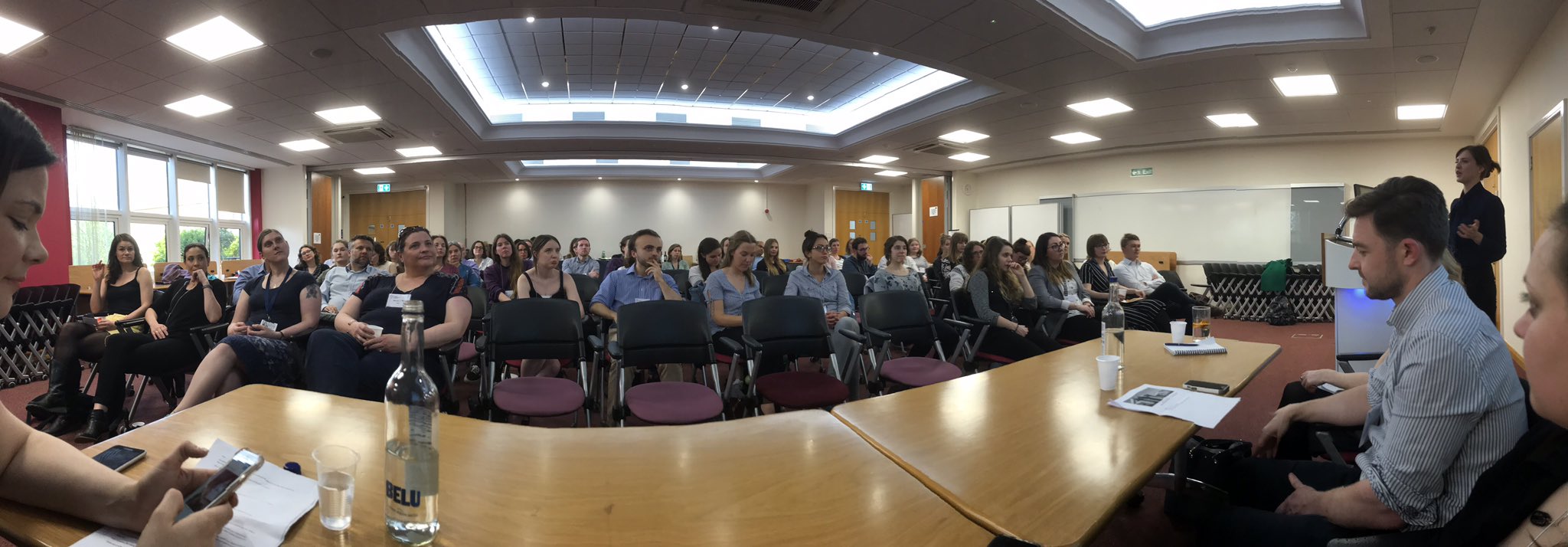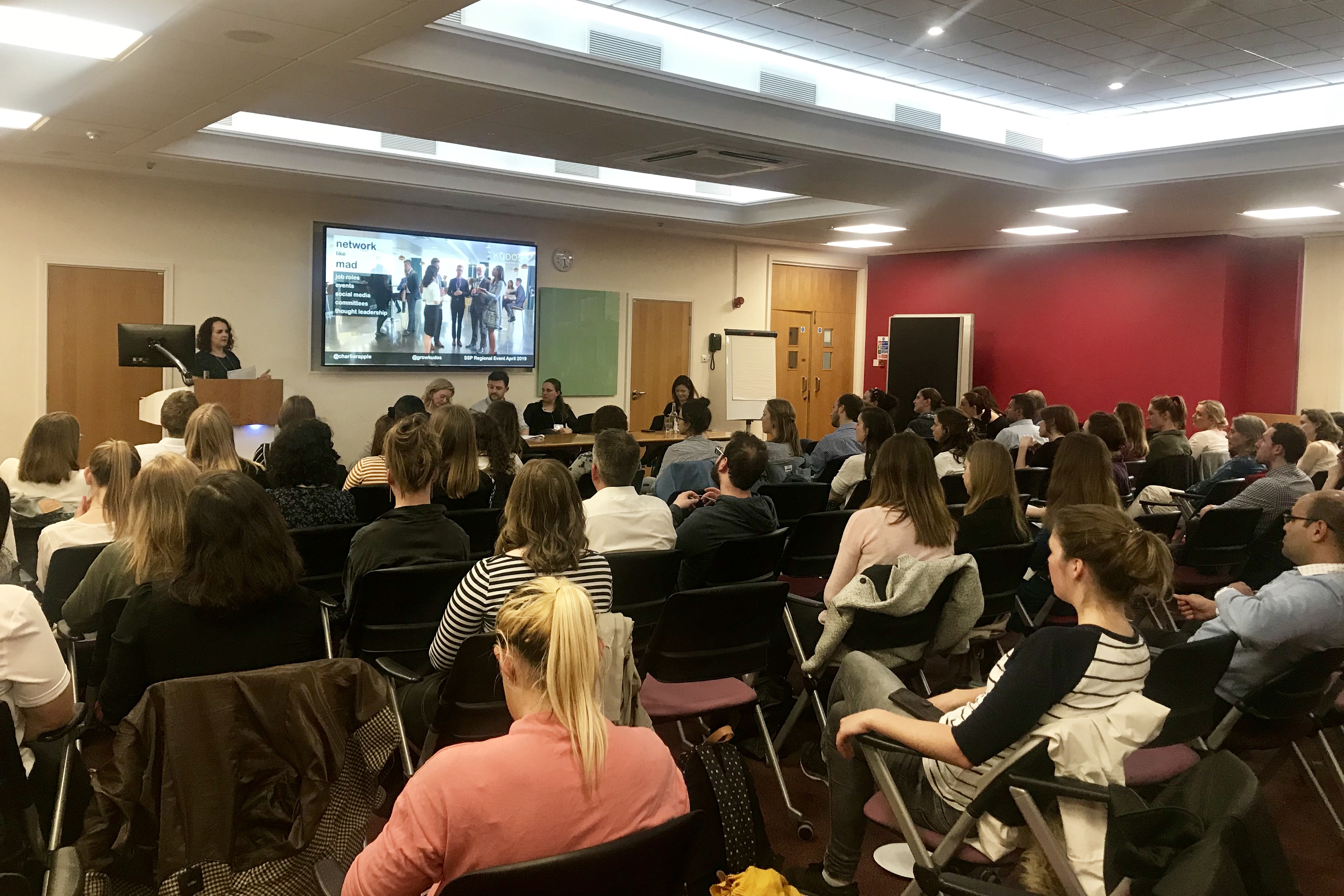Last week, I was part of a panel at the Society for Scholarly Publishing’s (SSP’s) first regional event in Oxford, UK. Hosted by Oxford University Press, and organized by Isabel Thompson (Holtzbrinck), Vanessa Fairhust (Crossref) and Sara Grimme (Digital Science), the evening’s focus was Building Your Career in Scholarly Communication: Tips, Tricks and Everything You Ever Wanted to Know! Here are some of the highlights (IMHO) from the talks (my own given in a bit more detail, given that I have better notes!).

Career breadth:
Highlights from Andy Sandland (Senior Business Development and Strategy Manager at Oxford University Press) (slides):
- Career development is not all about vertical ascent. Career breadth gives you knowledge of different departments, helping you be more efficient because you understand colleagues’ needs better. “You have a shortcut to a trusted relationship.”
- “Get involved in initiatives that take you out of your comfort zone. Get exposed to other people who will then have you in their mind when they are hiring.”
- “Speak the same language as your senior management — become financially literate. It will help you ask questions that are pertinent — or impertinent!” Understanding your business will help you help your managers, which will good for your #career
- “Relationships are key. It’s not ambition that moves you from job to job – it’s people that move you forward.”
The pros and cons of big companies vs small companies:
Highlights from Franca Driessen, Marketing Communications Manager at Elsevier (slides):
- “Having a large pool of colleagues can be fantastic. They’re the people you’re going to learn from.”
- “One of the big pros of working for a smaller organization is the more holistic view you have of the business, because it gives you a better understanding of what else you can do.”
- “Mentoring can be really rewarding for the mentor as well as the mentee. You learn a lot about listening, and about what matters to people in developing their career.”
- “Go for the long shot. Get involved. Talk to people, even scary senior ones. Set yourself challenges.”
Becoming a leader:
Highlights from Suzy Astbury, Managing Director at Inspired Selection (slides):
- “The scholarly communications industry needs innovation — you need to be open to change.”
- “Go for jobs that you can’t do 100%. Leave room to grow, to challenge yourself.”
- “Understand what your boss’s objectives are — do your job well, but help them do their job too and you will really be noticed. Don’t fight your boss — work with them.”
- “Set goals for everything. Networking event? Research it like you would a new job. Reach out to people in advance. And follow up.”
- “You don’t have to be in a leadership role to show leadership.” “Come up with ideas and solutions. Do research, put together a business case, find something extra curricular that adds value to the business.”

And my contributions (slides):
Network like mad
- My journey so far has included:
- Attending lots of events; making myself take that deep breath and introduce myself to people during coffee and lunch breaks
- Signing up for lots of discussion lists, and using social media (particularly at conferences) – listening, then gradually participating
- Volunteering for committees, working groups and editorial boards – I’ve been involved with KBART, UKSG, ASA, ALPSP, Learned Publishing, Insights, and FORCE
- Writing and presenting – putting forward submissions, accepting every invitation as a chance to practice if nothing else. Research Information is a great place to volunteer to write an article. UKSG is always open to new webinar ideas. The Scholarly Kitchen welcomes guest posts.
- Every one of these things helped me learn lots from other people, as well as building my visibility and reputation. There is of course a chicken and egg element to this — at the earlier stages in your career, you have more time to get more involved, but often lack the confidence to do this, thinking you don’t have the authority, credibility or influence to do things like run industry working groups. But actually the nature of working groups is that (a) the main thing you need is time! other people will bring expertise (b) by dint of taking up the position, you suddenly have authority, credibility, influence — and then you keep it when you move on to other things.
Be your best self
- As in, have confidence in yourself – but do also recognize and work on your weaknesses (self-awareness).
- How can you work on your confidence?
- Be authentic – figure out what you want to stand for. A lot of anxiety is caused by feeling you are trying to be something you’re not; it is tiring and limiting — not least because you are subjugating your values and needs to those of others – and it undermines people’s trust in you because they can sense the pretense and wonder what it masks. My favorite quote on this is from Brené Brown, via Sarah Durrant and Jo Walley, whose “Overcoming Imposter Syndrome” course was life changing for me: “Don’t puff up, don’t play small; stand in your holy ground”
- Other tips I learned from Sarah and Jo:
- Have your own back. Separate self-awareness from self-judgement, and treat yourself as you would a good friend – with kindness, compassion and forgiveness.
- Celebrate your own brilliance. Own and express your talents and abilities. I’ve also found that being more generous in praise of myself has opened up my ability to be more generous in my behavior with others, hence the reason this contributes to “being your best self”.
- “Get out of your own way”. I read that in an interview with Mary J. Blige, who in turn said she’d had this advice from Chaka Khan, which I rather like (Ain’t Nobody going to give you better advice than Chaka Khan…). I interpret it to mean “don’t let your anxieties hold you back”. For me this has meant having courage – and what I’ve learned is that it is only by confronting the things you fear that can take control of them. This seems to apply equally to spiders, public speaking or difficult discussions with colleagues.
- How can you be more self-aware, and how is that useful?
- Know (and counteract) your unhelpful thoughts, behaviors and triggers — I have found Albert Ellis‘ ABCDE model helpful for analyzing the way I respond to things, particularly when stressed or feeling marginalized, and enabling me to become more positive, collegiate and constructive / productive.
- Discipline your inner child (another phrase from Sarah and Jo, I think) — learning about the concept of neuroplasticity has been helpful for me in understanding that what I had considered instinctive reactions and innate behaviors (i.e., things I thought myself unable to change), are in fact possible to change, albeit requiring willpower and practice. You can recalibrate how you react to things. You can change your instinctive responses away from fear or self-judgement or negative or critical reactions. You can become a positive influencer – which is a critical skill to career development. The coach I worked with described neuroplasticity as being like going to the gym – it’s hard work at first – having to actively control yourself, stop and think before you react and respond – but the more you work at it, the more natural it becomes.
Get comfortable being uncomfortable
- As your career progresses, you will move further and further away from the point where you were on top of your to-do list and your inbox. You will have wider responsibilities, conflicting priorities, and a lot of things that never get done. And that’s OK. Your job will become about outcomes rather than outputs – about results rather than effort. For a while, this will feel uncomfortable – as you make the transition from one understanding of what makes you good at what you do, to a different way of evaluating yourself and your success. For me that has meant changing my thinking so that “being in control” means “being selective about what I do”, not “doing everything”. Sarah and Jo also had an inspiring quote related to this, from Brené Brown: “when perfectionism is driving us, shame is always riding shotgun and fear is the backseat driver”
I’ve referenced coaching a few times in this talk and write-up, and a few people followed up with me after the talk to ask more about the value of coaching. I think almost everyone I know who has had some coaching considers that it was life-changing. Not everyone’s employer is able to fund this level of personal development, and it is perhaps even more of a testament to the process / my coach that I paid for coaching out of my own pocket and considered it enormous value for money. If you are not prepared to fund your own professional development, then your career is potentially constrained by your current employer’s ability to be generous with time and budget (which may be particularly tough for small companies). You may value that separation of your professional identity and development from your current employer, and feel more able / less guilty about discussing future career choices if you are not being funded to do so by your current employer!
In summary
There was a fantastic turnout at the event, with over 80 people signing up; as Isabel Thompson puts it, “This speaks to the vibrancy of the scholarly communication industry across geographical areas, and the (sometimes untapped?) go-getting enthusiasm from individuals to develop themselves and their careers.” It was a well-structured evening with plenty of time for informal meeting and chatting, plenty of beer and wine to lubricate the networking, and masses of pizza to line the stomachs. SSP is anticipating holding more regional events (in the UK or elsewhere!) — if you are interested in helping to organize an event in your area, please email info@sspnet.org.

Discussion
12 Thoughts on "Building Your Career in Scholarly Communication: Tips, Tricks and Everything You Ever Wanted to Know!"
This sounds like such a great event! If anyone wants more amazing advice from Mary J. Blige, check out The London Sessions. <3
Excellent tip, thanks Abigail!
Thanks for pulling together this incredibly useful post, Charlie (and to the other speakers!). Only yesterday I was talking with a group of recent PLOS hires about building a career and the multiple shapes and routes that can take these days (vertical in one organization being long gone). I think that your advice is especially on point – I was probably a decade or more into my career before I had the confidence/courage/self-insight to embrace my own strengths, weaknesses and values. But it’s so important to have those as a “true north” to guide decisions about the opportunities that come up.
“True north” is a great way of conceptualising it – thanks Alison!
This is such a great post and useful to anyone in any industry who’s trying to figure out what they want to be when they grow up. Thanks for sharing.
You’re welcome – thanks for such a positive comment!
Thank you, Charlie, for this post; it sounds like it was a terrific event! These points resonate with me personally and professionally, as I’ve been increasing my efforts around networking, volunteering, learning outside my immediate area, and accepting speaking invitations. I particularly liked this way of thinking about changing self-perception: “…make the transition from one understanding of what makes you good at what you do, to a different way of evaluating yourself and your success.” Thanks again.
Thanks Karen! Yes, that articulation of that point was really something that only came together in my mind in preparing for this event, but once that thought had taken shape in my head, it struck me as one of the most important things I’ve learned and one of the most valuable things I could share!
Charlie, I can echo the value of a great coach. They can help you find your authentic self, and help you break through whatever is holding you back from daring to do more. In this time of (for our industry!) rapid change, these are valuable assets.
Yes! I think coaching is one of those things that you don’t really understand, or see the value of, until you try it, and then you wish you hadn’t left it so long to dip your toe in the water. Probably because by its nature, the “what” of coaching is nebulous and varied. It is whatever you need it to be. But “helping you break through whatever is holding you back” is a pretty good summary!
Thank you Charlie. I have been struggling recently with where to “go next” in my career when “up” isn’t an option. Being in a publishing role within a very small learned society I miss some of the L&D offerings provided by larger former employers which I took for granted.
Your article promoted me to identify where I might be using being busy and having a constrained training budget as an excuse to slack off from developing myself rather than admit a touch of the imposter syndrome! Time to volunteer for that committee and set up that chat over coffeee…


